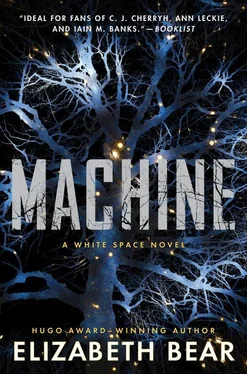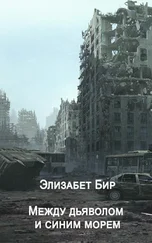Wouldn’t that be less work?
“Oh, probably,” I admitted. “Sure. But I choose to inhabit this conceptual space. To stretch it to accommodate me, rather than allowing it to contract. Because once a conceptual space starts to shrink by squeezing people out of it, it has a tendency to accelerate, and shrink and shrink and shrink until it squeezes out more and more people.”
And your conceptual space is woman.
“For now. Identities can be fluid over lifetimes, after all.”
Cheeirilaq inspected, then groomed the serrated edge of one raptorial forearm. That is an interesting perspective. But surely, sex is only important when one is choosing to reproduce.
That’s easy for you to say, Rilriltok commented. Then it ducked behind my shoulder, carapace showing variegated blues as it attempted to match my scrubs, the carpet, and the corridor walls all at once.
“Oh,” I said. “That’s why you folks prefer a singular, genderless pronoun.”
Rilriltok made the chirruping noise I associated with laughter. It’s not my fault humans are scandalous. We use gendered pronouns for animals and reproductive partners. And females that are trying to eat us.
Which amounts to the same thing, Cheeirilaq said.
I looked at it in surprise.
It said, There is no ethical sentient justification for my sex’s reproductive strategy. But we try to do better these diar.
“That almost sounds personal.” I had meant to be conversational. I realized that perhaps I’d overstepped when Rilriltok buzzed low against my shoulder. “I mean, I’m not sure there’s any ethical sentient justification for any species’s reproductive strategy—”
I come from a well-known female line. Some of my brilliant ancestors— its abdomen expanded as it drew a heavy breath, patterns of red and yellow veining appearing between the pale green plates— crafted the society our people now enjoy. But I do not think Rilriltok will argue with me when I say that they… deserved gendered pronouns.
I am ashamed of their legacy. I try to make some restoration with my own right behavior.
My mouth twisted against itself. I didn’t want to dismiss the Goodlaw’s willingness to acknowledge historic crimes or to accept accountability. But I was also interested in the conversation. “My ancestors came very close to destroying our species and our homeworld, but also managed to save it—and us—in spite of themselves. Or by finally understanding that everybody is responsible for fixing broken things, maybe. We had to learn that there were more important things than being ‘right.’ Brilliant people are sometimes terrible at being people. It goes a long way toward making their legacies complicated. I remember being taught an old ethics conundrum about whether humanity should give up space travel because Einstein was kind of a dick to his first spouse.”
“Wife,” Tsosie said, with uncharacteristic irrelevance.
“What?”
“They called them wives .”
“Some of us still call them wives,” I said. “Or at least that’s what I called mine, and vice versa. But I believe even archaically, it’s acceptable to use spouse interchangeably with gender-specific terms.”
“Huh.” Tsosie looked at me oddly. I frowned back until he shook his head. “Sorry, nothing. Just—we’ve served together for nearly ten ans, and I never knew that you were married.”
I smiled. “Possibly I was also kind of a dick to my spouse,” I admitted. “Or maybe she was kind of a dick to me. I honestly couldn’t tell you one way or the other, at this point. Subjectivity is a great ruiner of testimony.”
We reached the lift and stepped inside. Cheeirilaq considerately crowded itself into a back corner, tilting its long body almost vertical to give Rilriltok as much distance from its person as practical. Rilriltok scuttled around to my front.
“The great ruiner of testimony,” Tsosie said, “but the font of great art.”
“And here we are back to terrible people inconveniently not making terrible art.”
Expecting art to present absolute answers or offer tidy moral certainties is expecting art to act like propaganda, Cheeirilaq said, which made me think maybe I did not need to offer it my grammar school philosophy on dealing with the problematic acts of problematic ancestors.
It continued, Possibly your people do not find it rude to discuss sexual dimorphism because sexual dimorphism and gendered violence have caused less harm to your species than mine.
I was still too embarrassed to say anything. Tsosie came to the rescue.
“Less, maybe,” Tsosie said. “But I can only say that because I am talking to a Rashaqin.”
Rilriltok chirruped laughter.
Tsosie continued, “I would not say ‘none.’ I wouldn’t even say ‘not much.’ But isn’t maturity—individual, or as a species—acknowledging when you or your ancestors have done wrong, and trying to do better, not one-upping each other on who has suffered more?”
I was still trying to figure out how to paint myself back out of the corner I’d painted myself into—without sounding even more condescending—when the lift suddenly lurched, and gave a thud. I stumbled forward, instinctively throwing my hands out. Between me and my exo, we managed to brace against the wall without crushing Rilriltok under my large, endoskeletal body.
There was a second jolt, more terrible than the first. Tsosie fell against my back, then grabbed on to a rail beside me. We drifted for a moment, all four of us breathing heavily, and I braced for tearing, crushing, the pop of expelled atmosphere.
The lift started up again, and we dropped to the floor more heavily than I suspect Cheeirilaq or Rilriltok liked. I was glad my low-gravity friends had their magic belts on. It seemed to have dampened the worst of the impact.
Quickly, my neck and spine protesting the wrenches and impacts, I activated mine.
“Linden?” Tsosie asked.
“Dr. Tsosie,” she replied, a presence light pinging up beside the door panel. “Apologies for the discomfort.”
“Did we miss a transition?” I asked. To my knowledge, a Core General lift had never malfunctioned that way. Definitely not during my tenure here. “Are we going to miss a transition?”
I imagined the linking switches inside the branches and shafts slicing the lift in half. Their moorings tearing open the hospital’s hull and spilling atmosphere, staff, patients, crash carts, monitors into space.
There were safety overrides, but knowing that wasn’t very comforting right now.
“Apologies for the discomfort,” Linden said, as I tuned some of my pain away.
I remembered what Starlight had said about sabotage and accidents, and my breath hurt. “Linden, did you know that you’re repeating yourself?”
“The lift is safe,” Linden said. “You will arrive at your destination in ninety seconds.”
I looked at the others. Rilriltok was practically vibrating with fear. Cheeirilaq said, Ride it out?
“No more dangerous than diverting,” Tsosie answered. He rubbed his palms together, and I hoped he was right.
I turned toward the outside, and watched the lights of the lift cradle ripple past, outlined against the swirling sky. Biofeedback. Breathing. Tuning. No time to panic.
The lift sighed to a halt as liquidly as if nothing had gone wrong at all. I held my breath as the doors opened—
They did not open on void, the Big Suck, and freezing eyeballs. Nor did they open on choking chlorine or caustic vapor or searing steam. Just a quiet corridor on an ox deck with a couple of staff members hustling past in murmured conversation.
Читать дальше












